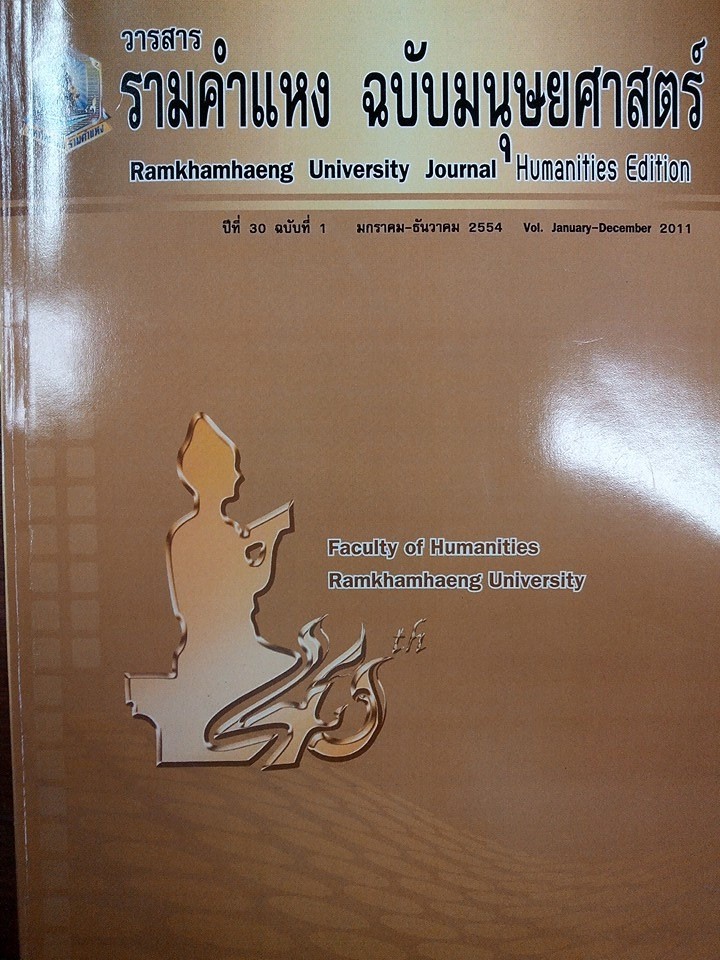หลักการเขียนรายการวิทยุและโทรทัศน์สำหรับเด็ก Writing Principles for Children8s Radio and Television Programs
Main Article Content
บทคัดย่อ
Abstract
Mass communication writers recommend that the script writers of children radio and television programs be aware of the childrenRs interest by presenting the programs according to their ages, stage of development, level of perception, and experiences. In programs for the earlyaged
children, active learning should be provided to encourage self-directed activities. For older children, subjects of their interests are explorers, adventures, Indians, presidents, any of the makers and shakers of the world whose lives can be told simply and colorfully. Writers know that children want to be entertained by radio and television programs. Even adults expect entertainment on radio and television. Radio and television were often
described in terms of their advantages. Many see them as essential ingredients in giving children access to the world. The radio and television programs can teach, brighten their intellects, and even inspire children. Radio and television programs, however, can do so only when children are
determined and inspired to use them. Otherwise, they will be merely an audio and video box. Lying ahead are great and perhaps decisive battles to be fought against ignorance, intolerance, and indifference. Radio and TV programs may be used as weapons to fight the battles. In writing
for childrenRs radio and television programs, the script writers have to use appropriate writing techniques, such as using words that are simple and clear, avoiding too much dialogue, using lively language and childrenRs words, employing simple plots, holding childrenRs short attention
span, using scenarios that the children may have not seen in school, providing new experiences, condescending or patronizing, and avoiding confusing content. The writers for childrenRs radio and television programs must also keep in mind dthe ten commandments for writers.e
Mass communication writers recommend that the script writers of children radio and television programs be aware of the childrenRs interest by presenting the programs according to their ages, stage of development, level of perception, and experiences. In programs for the earlyaged
children, active learning should be provided to encourage self-directed activities. For older children, subjects of their interests are explorers, adventures, Indians, presidents, any of the makers and shakers of the world whose lives can be told simply and colorfully. Writers know that children want to be entertained by radio and television programs. Even adults expect entertainment on radio and television. Radio and television were often
described in terms of their advantages. Many see them as essential ingredients in giving children access to the world. The radio and television programs can teach, brighten their intellects, and even inspire children. Radio and television programs, however, can do so only when children are
determined and inspired to use them. Otherwise, they will be merely an audio and video box. Lying ahead are great and perhaps decisive battles to be fought against ignorance, intolerance, and indifference. Radio and TV programs may be used as weapons to fight the battles. In writing
for childrenRs radio and television programs, the script writers have to use appropriate writing techniques, such as using words that are simple and clear, avoiding too much dialogue, using lively language and childrenRs words, employing simple plots, holding childrenRs short attention
span, using scenarios that the children may have not seen in school, providing new experiences, condescending or patronizing, and avoiding confusing content. The writers for childrenRs radio and television programs must also keep in mind dthe ten commandments for writers.e
Article Details
รูปแบบการอ้างอิง
สุวรรณเพิ่ม ด. (2014). หลักการเขียนรายการวิทยุและโทรทัศน์สำหรับเด็ก Writing Principles for Children8s Radio and Television Programs. วารสารรามคำแหง ฉบับมนุษยศาสตร์, 30(1), 110–130. สืบค้น จาก https://so05.tci-thaijo.org/index.php/huru/article/view/27886
ประเภทบทความ
บทความวิชาการ

อนุญาตภายใต้เงื่อนไข Creative Commons Attribution-NonCommercial-NoDerivatives 4.0 International License.
ประกาศลิขสิทธิ์จะปรากฏในเกี่ยวกับวารสาร ควรอธิบายสำหรับผู้อ่านและผู้เขียนว่าเจ้าของลิขสิทธิ์เป็นผู้เขียนวารสารหรือบุคคลที่สาม ควรรวมถึงข้อตกลงการอนุญาตเพิ่มเติม (เช่นใบอนุญาตครีเอทีฟคอมมอนส์) ที่ให้สิทธิ์แก่ผู้อ่าน (ดูตัวอย่าง) และควรให้วิธีการรักษาความปลอดภัยหากจำเป็นสำหรับการใช้เนื้อหาของวารสาร


